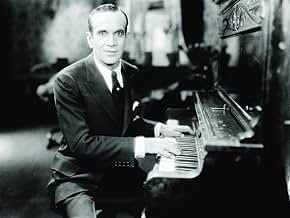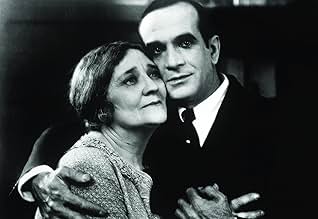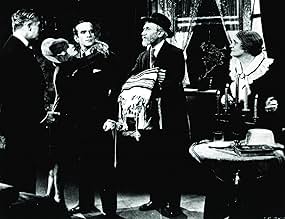Le fils d'un chanteur juif doit défier les traditions de son père religieux afin de réaliser son rêve et devenir chanteur de jazz.Le fils d'un chanteur juif doit défier les traditions de son père religieux afin de réaliser son rêve et devenir chanteur de jazz.Le fils d'un chanteur juif doit défier les traditions de son père religieux afin de réaliser son rêve et devenir chanteur de jazz.
- Réalisation
- Scénario
- Casting principal
- Nommé pour 1 Oscar
- 3 victoires et 1 nomination au total
- Jakie Rabinowitz - Age 13
- (as Bobby Gordon)
- Cantor Rosenblatt - Concert Recital
- (as Cantor Joseff Rosenblatt)
- Chorus Girl
- (non crédité)
- Chorus Girl
- (non crédité)
- Small Part
- (non crédité)
- Choreographer - 'April Follies'
- (non crédité)
- Small Part
- (non crédité)
- Violinist
- (non crédité)
- Small Part
- (non crédité)
- Buster Billings
- (non crédité)
- Dance Director
- (non crédité)
Avis à la une
If ever you want to get a real kick see this movie, if you can find a viewable copy, and revel in the historical significance of it. Also take out your copy, or pick up Singing In The Rain, which pays homage to the advent of talking pictures. Although they goof with the characters, such as the voice of Lina Lamont, the very real challenges of transitioning from a silent world to a talkie world is very evident.
Though, not being the first "talkie", The Jazz Singer, is certainly a remarkable film; it still holds its place as an cinematic landmark for being the first feature-length Hollywood "talke" film in which "spoken dialogue was used as part of the dramatic action." However, it's still largely a silent film with a synchronized musical score and a handful of sound sequences built around singing. It's also become something of a controversial case because of Al Jolson's (arguably the most popular entertainer of his time) use of blackface in some of the musical sequences, forgetful of the fact that this was a theatrical artifice from the era; it wasn't intended as "mean-spirited" as so many claim it to be. It was actually praised by black newspapers in 1927, and was being done by another much defamed minority, a Jew.
You can see what an impact sound must have had in 1927, because it certainly wasn't the movie that made this production a phenomenon. Though, the film itself, is more than just a movie about a guy who likes music. It's also a story about a Jewish kid who turns his back on his heritage to try and make it big on the stage - exceptionally daring subject matter for its era, and still enthralling today. It's certainly not ragged and dull, though, the magic moment when Jolson turns to the camera to announce, "You ain't heard nothing' yet" - a line so loaded with unconscious irony that it still raises a few goose bumps. Audiences were captivated by this and still are to this very day. A must see!!!
I have great difficulty in understanding the comments listed in the posts of how today's human rights standards can be applied to a film that was created 80 years ago.
We are talking about 1927,and it is hard for me to understand how today's negative comments are made about the Black-face and other racial comments. This was a convention of the time 80 years ago. I do not for a moment agree that the way minorities were treated was correct, but that was 1927, not now! You cannot erase history to make it fit today's standards.
I thought Al Jolson did a superb job in his singing,dialog,and acting in this film for the era. One would need to review and compare the singing and acting styles,that of other performers of the era and make comparisons. Crosby, Sinatra, Eddie Fisher, even Elvis Presley & Jackie Wilson said that Al Jolson was a great influence on their careers. To say he could not sing as in some posts here, is absurd.
Le saviez-vous
- AnecdotesThis is the first feature-length movie with audible dialogue.
- GaffesMary recieves a telegram dated August 8, 1927. Later in the film, Jack is seen writing a letter to Mary, dating it August 7, 1927.
- Citations
[opening lines, first quote and first words in the first widely-seen talking picture]
Jack Robin: Wait a minute, wait a minute, you ain't heard nothin' yet! Wait a minute, I tell ya! You ain't heard nothin'! You wanna hear "Toot, Toot, Tootsie"? All right, hold on, hold on...
[then he walks back to one of the band members]
Jack Robin: Lou, listen. Play "Toot, Toot, Tootsie", three chorus, you understand. In the third chorus, I whistle. Now give it to 'em hard and heavy, go right ahead.
- ConnexionsEdited into Okay for Sound (1946)
- Bandes originalesMy Gal Sal
(1905) (uncredited)
Written by Paul Dresser
Sung by Robert Gordon (dubbed by an unidentified singer)
Meilleurs choix
Détails
Box-office
- Budget
- 422 000 $US (estimé)
- Durée
- 1h 28min(88 min)
- Couleur
- Rapport de forme
- 1.33 : 1


















